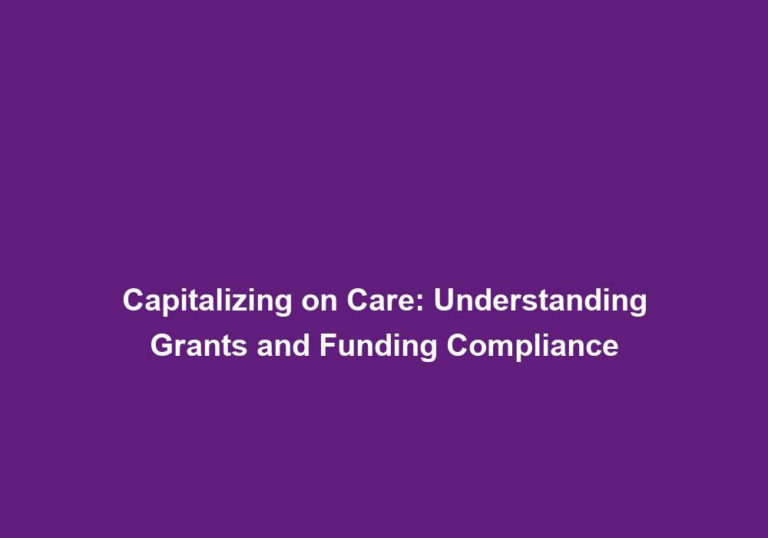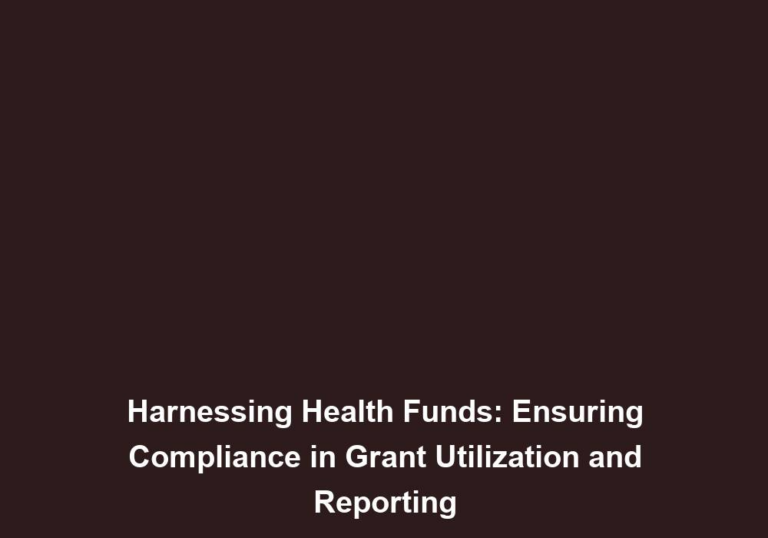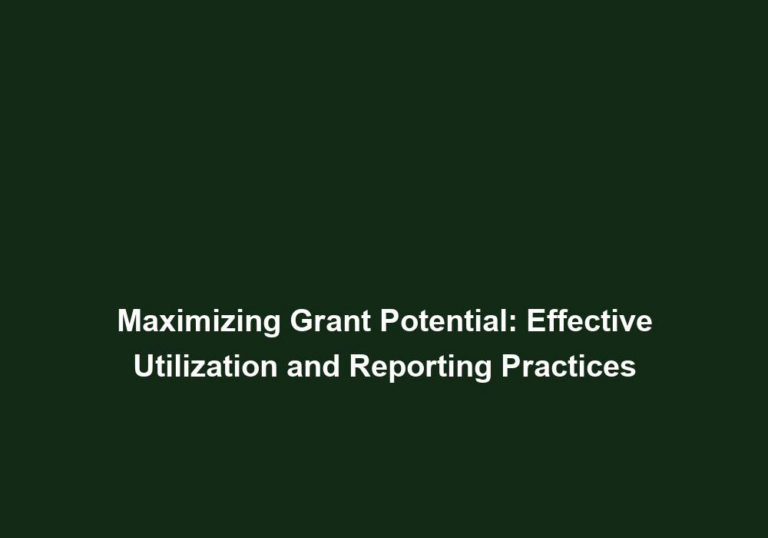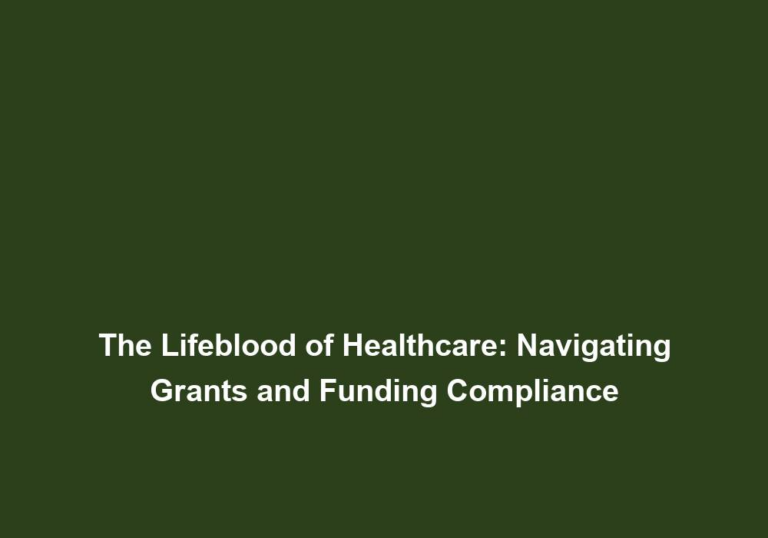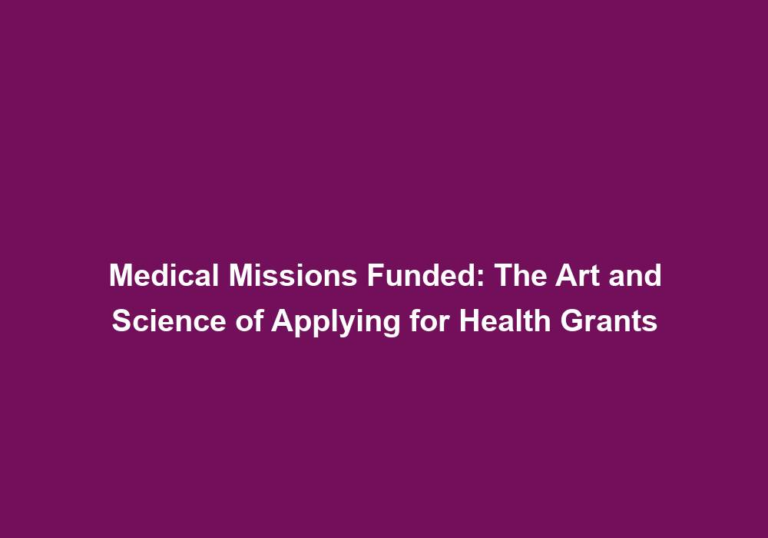From Award to Account: Best Practices for Grant Utilization and Reporting
In the realm of nonprofit organizations and government agencies, grants play a crucial role in funding various projects and initiatives. However, receiving a grant is just the beginning of an organization’s journey. In order to maximize the impact of the funding received, it is essential to have effective strategies for grant utilization and reporting. This article will explore the best practices that can help organizations make the most of their grants and ensure transparent reporting.
Understanding the Grant
Before delving into grant utilization and reporting, it is important to fully understand the terms and conditions of the grant. Take the time to carefully review the grant agreement and any accompanying documentation. Familiarize yourself with the specific objectives, budgetary restrictions, reporting requirements, and timelines associated with the grant. This will provide a solid foundation for effective grant management.
To ensure a clear understanding of the grant, organizations should consider the following:
- Read the grant agreement thoroughly, paying attention to every detail.
- Take note of the specific objectives outlined in the grant and ensure alignment with the organization’s mission and goals.
- Understand the budgetary restrictions to effectively plan and allocate funds.
- Be aware of the reporting requirements and timelines to ensure compliance.
By investing time and effort into understanding the grant, organizations can avoid misunderstandings and navigate the grant utilization process more effectively.
Developing a Comprehensive Plan
To ensure efficient utilization of grant funds, it is crucial to develop a comprehensive plan that outlines the intended outcomes, activities, and budget allocation. This plan should align with the objectives and guidelines set forth by the grantor. By clearly defining the project scope, timeline, and budget, organizations can effectively allocate resources and track progress throughout the grant period.
When developing a comprehensive plan, organizations should consider the following:
- Clearly define the project outcomes and activities that will be supported by the grant.
- Break down the budget allocation to ensure funds are appropriately distributed across different aspects of the project.
- Establish a realistic timeline that accounts for the completion of key milestones and reporting requirements.
- Align the plan with the grantor’s objectives and guidelines to demonstrate a clear understanding and commitment to the funding agreement.
By having a well-defined plan in place, organizations can effectively utilize grant funds and ensure that resources are allocated strategically.
Budget Management and Tracking
One of the key aspects of grant utilization is effective budget management. It is important to establish a robust system for tracking expenses, ensuring that funds are allocated appropriately, and staying within budgetary limits. Utilizing accounting software or spreadsheets can help organizations maintain accurate records of expenses and easily generate financial reports when required.
To effectively manage and track the budget, organizations should consider the following:
- Implement a reliable accounting system to record and track all expenses related to the grant.
- Regularly review and reconcile financial records to ensure accuracy and identify any discrepancies.
- Monitor expenses against the budget to ensure funds are allocated appropriately and within the approved limits.
- Generate financial reports on a regular basis to provide a clear overview of the budget utilization.
By implementing strong budget management practices, organizations can ensure that grant funds are used wisely and transparently.
Regular Monitoring and Evaluation
Continuous monitoring and evaluation are essential to ensure that grant funds are being utilized effectively and efficiently. Regularly review project activities, outcomes, and any changes or challenges encountered. This enables organizations to make timely adjustments, address any issues, and maintain focus on achieving the desired outcomes. Monitoring and evaluation also provide valuable data for reporting purposes.
To effectively monitor and evaluate the progress of a grant-funded project, organizations should consider the following:
- Establish clear indicators and milestones to track progress and measure success.
- Regularly review project activities and outcomes to identify any deviations from the plan.
- Address any challenges or changes in a timely manner to ensure the project stays on track.
- Use data and metrics to evaluate the impact of the project and identify areas for improvement.
By continuously monitoring and evaluating the project, organizations can ensure that grant funds are utilized effectively and that desired outcomes are achieved.
Transparent Reporting
Reporting is a critical component of grant utilization. It helps maintain accountability and transparency with the grantor, as well as provides an opportunity to showcase the impact of the funded project. Ensure that all reporting requirements are met within the specified timelines. Prepare comprehensive reports that highlight the progress made, challenges faced, lessons learned, and the overall impact of the project. Use data, metrics, and anecdotes to illustrate the outcomes and provide a clear picture of how the grant funds were utilized.
To ensure transparent reporting, organizations should consider the following:
- Familiarize yourself with the reporting requirements outlined in the grant agreement.
- Collect and analyze relevant data to support the report, highlighting the project’s achievements and impact.
- Include specific examples and anecdotes that demonstrate the effectiveness of the project.
- Clearly outline any challenges faced during the project and discuss how they were addressed.
By providing comprehensive and transparent reports, organizations can effectively communicate the impact of their projects to the grantor and stakeholders.
Effective Communication with the Grantor
Maintaining open and effective communication with the grantor is vital throughout the grant utilization process. Establish a strong relationship by proactively communicating progress, challenges, and successes. Seek clarification whenever needed and keep the grantor informed about any major developments or changes in the project. This not only helps build trust but also provides an opportunity to seek additional guidance or support, if required.
To ensure effective communication with the grantor, organizations should consider the following:
- Establish a regular communication schedule to provide updates on project progress.
- Share successes and challenges openly, seeking guidance or support when needed.
- Seek clarification on any grant-related issues to ensure a clear understanding of expectations.
- Be proactive in sharing relevant project information and milestones to keep the grantor informed.
By maintaining open and effective communication, organizations can foster a positive relationship with the grantor and ensure a smoother grant utilization process.
Capacity Building and Sustainability
Grant utilization is not just about immediate project implementation; it is also about building organizational capacity and ensuring long-term sustainability. Use the grant as an opportunity to enhance skills, knowledge, and resources within the organization. Invest in training and professional development programs for staff members involved in the project. Additionally, focus on sustainability by exploring ways to leverage the project outcomes and secure future funding beyond the grant period.
To build capacity and ensure sustainability, organizations should consider the following:
- Identify areas for skill enhancement and invest in training programs for staff members involved in the project.
- Explore partnerships or collaborations that can provide additional resources and support beyond the grant period.
- Develop a plan for leveraging the project outcomes to attract future funding or sustain the initiatives.
- Continuously assess and update the organization’s strategies and processes to adapt to changing circumstances.
By focusing on capacity building and sustainability, organizations can maximize the long-term impact of grant funds and ensure the continued success of their initiatives.
Conclusion
Effectively utilizing and reporting on grants requires careful planning, budget management, monitoring, and transparent reporting. By following these best practices, organizations can optimize the impact of grant funds, maintain accountability, and build strong relationships with grantors. Remember that grant utilization is not just about financial management; it is also an opportunity to strengthen the organization’s capacity and contribute to long-term sustainability.


